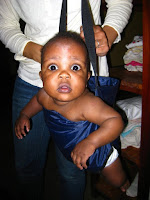 |
| Little babes all in a row |
Things improved slowly after that - as the babies got bigger and some of the toddlers, like Baracka and Maureen, became more independent and needed less help, we were able to get the babies up every day, outdoors every day. They began to eat formula and then food, to gurgle and sit. By the time my father, Dr. David Ross Russell, did physicals on all of the children in April, none of them were too far out of line for their age. Unfortunately, since then, several of the children have plateaued. Gorgeous Frankie and Maureen, who are both over a year, are yet to crawl, although they are making attempts with their arms. Their weights are normal and they seem to be otherwise healthy.
 |
| Frankie definitely isn't underweight! |
Studies show that children in orphanages lag an average of one month of development behind for every three months they stay in the institution. When the children are spaced in age, and we have enough volunteers, we can often thwart that delay - with this cohort of children, we have failed. We don't know how long it will take them to catch up, or what it will take, or whether it is even possible. We hope that it is. We're already planning intensive intervention with the children during our December trip, and to train the volunteers arriving in January to continue that work. But who knows if it will be enough?
The truth is, any time that we don't fail, it is a matter of luck. There are twelve women covering the orphanage, twenty four hours per day, seven days per week. That means that there are between two and three caretakers at any given time for thirty children. The orphanage is desperate to hire more staff, but they cannot do it without help. Consider that those women need to complete, every single day, shopping for thirty children, preparing food from scratch for thirty children, boiling water to drink for thirty children, washing clothes for thirty children, changing and washing cloth diapers for at least ten children, and running school for all the rest. When the water is out, or a child is sick, a mama will be unavailable for anything else until the problem is resolved. The mamas are heroic - but they are human. The children are resilient - but not invulnerable.
They need more time than we have been able to give them. That's why I want to talk about one very specific and direct form of donation. It costs $100 USD, or about £65 GBP, to employ a caretaker for a month. Not all of us can commit to that full amount - but what about half of it? What about a quarter of it? If we can get the financial backing from you, we will hire new staff and have them working with these children SOON. Think about the upcoming holidays - is there anyone on your list who would feel good about giving a chance at normal development to an orphaned child? Who would rather know that a woman in the developing world has a job, and a group of orphaned children have a caretaker, than have another piece of electronic equipment or jewelry?
This isn't just a fuzzy, feel-good approach to combating the problem - numerous studies have shown that even severely neglected children, which these children are NOT, can recover to an amazing degree once they are given the proper attention, exercise, and encouragement. Look at Zawadi, who was not only unable to crawl at a year old, but had severe worms and rickets - and now she's walking up a storm. Simoni, who couldn't walk at two and a half years old, only scoot, because no one had had the time to work with him to overcome his rickets. And now he's running all over the place. Our babies can recover, and given a chance, they WILL recover. Our job is to give them that chance, and to give the orphanage the resources so that we don't face this problem with each cohort of children.
After that, it's out of our hands.
No comments:
Post a Comment